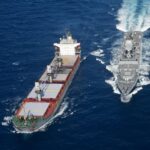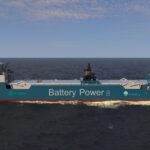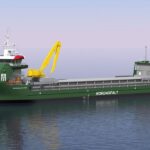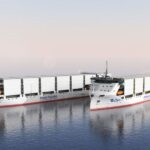Energy News Beat
Andrew Craig-Bennett reflects on Signalgate and the sale of Hutchison Ports, two events that highlight how ignorant most people are about all things maritime.
There is a thing called sea blindness. It is not a disease of seafarers, like scurvy once was. It is not even a mental condition of seafarers, like channel fever still is. It is a mental condition of non-seafarers, and I have just realised that it is sometimes dangerous.
As ships grew larger, after World War II, ports and industries that depended on cargoes arriving by sea, such as oil refineries and steelworks, moved out of the cities that had grown up around them, and sprang up on green field sites handy for deep water, on the coast. As this went on, the non-seafaring bulk of the population became less and less familiar with ships and the sea. That’s what created sea blindness, the unawareness of things maritime amongst populations at large.
This gives us odd moments of amusement such as when a containership, with a deck stack of containers, is called a tanker, and so on, but until very recently I did not think that it was dangerous.
Two things changed my mind.
The first was the kerfuffle over CK Hutchison selling its container terminals. From a shipping industry perspective, there may indeed be an anti-trust element, in that, very roughly, Hutchison has about 5% of the world’s container terminals by volume and MSC, who are associated with BlackRock in the buying consortium, also has around 5% of the world’s container terminals, but it is very difficult for anyone in shipping to see a container terminal as any sort of a facility that might have a military use.
A container terminal is a reasonably deepwater quay, one or more gantry container cranes, some flat land concreted over, some container handling and stacking equipment, a customs facility, some offices, and road and sometimes rail and river or canal access. We all know that. It has no military application at all. You cannot fly aircraft into or out of a container terminal, you cannot house troops and their equipment in a container terminal, you cannot berth warships in a container terminal because the quayside is in constant use, you cannot maintain anything except the terminal’s own equipment in a container terminal, and that equipment is large, delicate and easily damaged.
Maybe the problem is that container terminals like to call themselves ports? Ports are different; ports do have a military value – a remarkably high one, if military logistics are in the picture, but a port is a different thing. A container terminal is a part of a real port or harbour; it is not the port or harbour.
And nobody checks. Nations make belligerent noises – about nothing. It would be silly if it were not so dangerous.
The second thing was Signalgate – the ludicrous business of half of the Trump cabinet inviting the editor in chief of The Atlantic into an online chat between themselves about bombing Houthi-controlled Yemen, during which both the vice president of the US and the secretary of defence of that nation wondered why they were about to drop bombs on the Houthis when this was only going to benefit Europe.
If Vance and Hegseth knew anything about our industry, they would know that the Houthis by effectively quasi-closing the Suez Canal have not affected the arrival and departure of goods travelling by sea to and from Europe, what they have done is to put up freight rates everywhere.
Since the Suez Canal, as we all know, and it seems nobody else does, prices its transits by reference to what it would cost a ship to go round Africa, so as to be just a bit cheaper, the difference in voyage cost is present, but it’s not huge. What makes the difference in charter rates is the time factor, which reduces the supply of ships and, because freight demand is not price sensitive, puts the time charter rates and the time charter equivalent rates up. And because a ship can travel anywhere on the high seas where there is water for her, those higher charter rates are just as present in the American trades as in the European trades. The professionals in the US Department of Defence know that, of course.
It seems their political masters do not.
The post The dangers of sea blindness appeared first on Energy News Beat.









